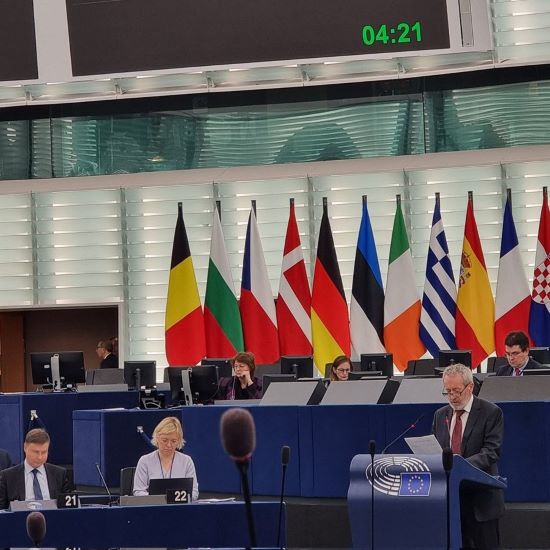The UN General Assembly resolution 2758 (XXVI) of October 25 1971, deprived the Republic of China, Taiwan, of its seat in the UN and led to the country’s isolation. In addition, it prevented the European countries from valuable relations with a country that has remarkable successes in science, medicine and advanced technologies.
Based on the absurd and imperialist theory of “One China”, the People’s Republic of China tries to isolate, deprive of diplomatic relations, and intimidate through naval exercises its small but prosperous neighbour. At the same time, it doesn’t hide its intentions of annexing Taiwan.
The European Union has adopted the “One China” policy, meaning it does not have diplomatic relations with Taiwan. However, Taiwan has emerged as the EU’s 12th largest trading partner this year (2022), and the total trade in goods has reached a record of 84.2 billion euros.
The EU also stands as Taiwan’s largest foreign investor. Taiwan is renowned for producing high-tech goods, particularly semiconductors and electronic products, crucial for the EU’s green and digital transitions. Furthermore, it is an essential destination for EU high-tech machinery.
Beijing threatens Western independent states with “severe economic consequences” when they try to improve relationships with Taipei. As it does when Western democracies express support to the human rights activists in China, the democratic movement in Hong Kong, the rights of Uyghurs in Xinjiang province and the Tibetans in occupied Tibet.
China reacted harshly when the Mayor of Prague, Zdeněk Hřib, welcomed the prime minister of the Tibetan government in exile in March 2019. Beijing also responded with threats when Lithuania decided to improve relations with Taiwan by opening a “Taiwanese Representative Office” in Vilnius in 2021.
However, this situation is changing. Several EU member states have reconsidered their relations with China, deepening trade and scientific ties with Taiwan.
The Czech Republic, the Baltic States, and Slovenia are among those EU-member states that upgraded relations with Taipei, although they still adopt the “One China policy”. The last blow to China’s penetration into Europe was the decision of the Italian government to withdraw Italy from the ambitious Belt and Road Initiative (BRI) this year.
Significantly, Taiwan cooperates with the Czech Republic in a programme to reconstruct Ukraine.
The European Parliament
The European Parliament, on several occasions, condemned China’s imperialist behaviour towards Taiwan as well as the continuing breach of human rights by the regime of Beijing.
On Wednesday, December 13, MEPs backed a resolution calling for the Commission and Taiwan to strengthen cooperation and boost economic ties. The adopted by show of hands a resolution calling on the EU to increase trade and investment cooperation with Taiwan through a formal bilateral agreement.
The resolution urges the Commission to initiate discussions with Taiwan quickly to create a resilient supply chain agreement. The Members of the European Parliament believe there are opportunities for cooperation in critical infrastructure protection, economic security, and protection against economic coercion. The resolution calls for better collaboration of digital trade, customs, and cyber resilience.
The non-legislative resolution emphasises that Taiwan is crucial in the EU and global supply chains. It also highlights the strategic importance of trade and economic relations with Taiwan as a reliable partner, in line with the European Union’s economic security strategy, in the current geopolitical context.
The Commission was asked how it plans to deepen trade and investment ties with Taiwan to strengthen economic resilience and strategic autonomy.
“We ask the European Commission to increase trade and investment cooperation with Taiwan, building on the progress recorded in the Trade and Investment Dialogue rounds. Through this resolution, we have reiterated our call for a bilateral Investment Agreement and for concrete proposals on an agreement that would boost supply chain resilience for strategic inputs. At the same time, we need to work harder to solve remaining trade irritants in key areas such as renewable energy or sanitary and phytosanitary (SPS) measures,” rapporteur Iuliu Winkler (EPP, RO) said.
The parliament appreciates democratic rules in Taiwan
China invested strongly in lobbying in Brussels. Several institutes or think tanks support Beijing’s official policy today.
However, despite the efforts of the pro-Chinese lobby, the parliament expressed different views on several occasions.
A resolution approved by the parliament with 424 votes in favour, 14 against, and 46 abstentions in September 2022 stressed that “on the democratic island of Taiwan, it is up to the people to decide how they want to live”.
In the resolution, MEPs denounced China’s recent and unprecedented live-fire military exercises in the Taiwan Strait, which began in August 2022 following a visit to Taiwan by the Speaker of the United States House of Representatives, Nancy Pelosi.
MEPs have demanded that the Chinese government not take any actions that might destabilise the Taiwan Strait and regional security.
They have also encouraged the EU to follow Lithuania’s example and strengthen its relations with Taiwan, recognising its status as a like-minded EU partner.
The parliament noted Taiwan’s strategic trade position and its leading role in the global supply chain’s critical high-tech sectors, including semiconductors.
Additionally, the resolution welcomed Lithuania’s plans to open a trade representation office in Taipei in the autumn of 2022. It urged other EU countries to follow suit and strengthen their bilateral relations with Taiwan.
The relations between the Parliament and Taiwan are constantly increasing. Last October, a delegation of the EP-Taiwan Friendship Group, led by its Vice Chair Andrey Kovatchev, paid a six-day visit to Taiwan. Kovatchev is a significant advocate for visa-free entry to the Schengen area for Taiwanese citizens. The delegation met several politicians and government officials and was received by Taiwan President Tsai Ing-wen. The visit highlighted the strong support for Taiwan among the members of the parliament.

